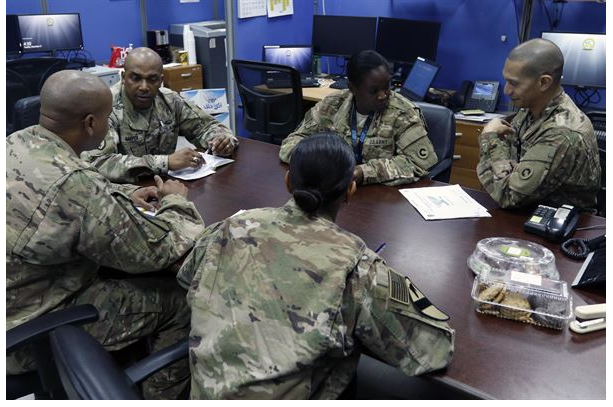Strategic Communication with Muslim Majority Nations Following 9/11 (Case Study)

As a graduate student studying INSS and in particular the application of IO through strategic communications, I had the distinction of being exposed to a wide assortment of peers within my courses. Their respective career paths and the intense reinforcement of status quo political perspectives was an interesting study in itself One student in particular worked as an analysts for a fusion center for the Dept of Homeland Security. The following article represents some of the one sided perceptions regarding IO and SC post 9-11 from the inside. It is interesting to note that the vast majority like all humans, especially in crowd reinforcing environments will not exhibit and contrary views.
Strategic communications, as defined in a 2005 article in Joint Forces Quarterly is the “synchronized coordination of statecraft, public affairs, public diplomacy, military information operations, and other activities, reinforced by political, economic, military and other actions, to advance U.S. foreign policy objectives” (Paul, 2011). Today there is continued emphasis on the importance of winning the hearts and minds of the local populace in order to have the ability to defeat insurgencies and to foster positive relations with the civilian population. The ability of the United States to undermine international terrorist organizations and insurgencies in addition to combating violent extremism are crucial, yet are only a small portion of what the U.S. strategic communication effort should comprise. The U.S. has had significant challenges in having a stronger strategic communication plan with Muslim majority nations, which includes reaching out to those that share US ideals and to support those who struggle for freedom and democracy.
In general, the United States needs to improve their effort in listening to what these nations are saying and taking their views more seriously. Foreign policy cannot be effective without understanding and anticipating the responses of other parties. There are several ways that can improve the outcome of communications with Muslim majority nations, including the continued development of programs to train Americans or those who are already fluent in local languages with public diplomacy skills and to exert presidential leadership in public diplomacy.
During his presidency, President Obama proposed an “America’s Voice Corps,” which was modeled after the Peace Corps. The goal of the program was to rapidly recruit and train fluent speakers of local languages (i.e. Arabic, Farsi, Bahasa, Urdu, and Turkish) with public diplomacy skills, who can ensure our voice is heard in the mass media and in our efforts on the ground. This program was never implemented and only discussed initially during the 2008 presidential campaign. America’s Voice Corps had the potential for giving young Americans good language skills that they would need to have regular contact with a wide range of Arabs and Muslims. One of the findings in the Advisory Commission on Public Diplomacy’s 2005 report was that the State Department only had five Arabic speakers capable of appearing on behalf of the U.S. government on Arabic language television. The further development of this program would allow for strengthened relations with the Muslim world in addition to enhancing the amount of fluent Arabic speakers with public diplomacy skills (Amr & Singer, 2016).
Credibility of the United States is damaged when the United States fails to do what it says it will do and when actions contradict stated intentions (Paul, 2011). The Bush administration had their fair share of problems regarding the credibility and standing in the Muslim world. Shortly after 9/11, President Bush visited the Islamic Center of Washington to make it known that him and his Administration knew that Islam was not to blame for the attacks. This message was lost very quickly after a series of anti Muslim statements have been made since then by various policymakers and close Administration supporters, by calling Islam a violent and wicked religion (Paul, 2011). As such, President Obama had challenges when first taking office in improving American relations with the Arab world.
During his first official interview as president, he chose an Arabic television station and advised viewers that he was going to be a president who was listening to them (Lynch, 2009). According to Paul, every message has the potential to be seen anywhere, which certainly has significant impacts on strategic communications. Presidential leadership, which is currently not being exerted by the Trump administration in this area, needs to deliver a major policy address which outlines goals for a future of relations between America and the Muslim world. Today, ideals are continually watched by the rest of the world, and at a time when many in the world expect the worst of the US, negative statements and setbacks in relationship building only support enemy propaganda and recruitment efforts.
References:
Amr, H. & Singer, P.W. (2016). Engaging the Muslim World – A Communication Strategy to Win the War of Ideas. The Brookings Institution. https://www.brookings.edu/wp-content/uploads/2016/06/PB_MuslimWorld_PSinger.pdf
Lynch, M. (2009). Public diplomacy and strategic communications: “The Conversation”. Foreign Policy. http://foreignpolicy.com/2009/02/20/public-diplomacy-and-strategiccommunications-the-conversation/
Paul, C. (2011). Information Operations – Doctrine and Practice: A Reference Handbook. Westport, CT: Praeger.
Paul, C. (2011). Strategic Communication: Origins, Concepts, and Current Debates. Westport, CT: Praeger.
Image Credit: http://www.usar.army.mil - Strategic Operations and Plans (SOaP)